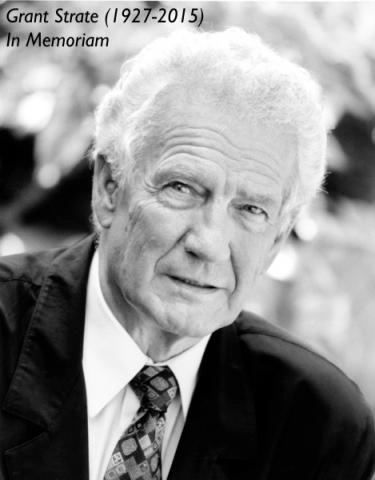Reprinted courtsey of Michael Crabb and The Toronto Star
Grant Strate, a pioneering and influential figure in Canadian dance, died Monday evening at his Vancouver home after a short battle with cancer. He was 87.
Strate was a charter member of the National Ballet of Canada in 1951 and later its first resident choreographer. Although none of his modernist-influenced works for the company has survived, in the 1950s and ’60s they drew critical plaudits, as well as occasional condemnation, for their boldly progressive esthetic.
He also served as assistant to founding artistic director Celia Franca and was instrumental in the National Ballet’s 1964 acquisition of John Cranko’s Romeo and Juliet, a lavish full-length work that Strate had admired during one of his choreographic sojourns in Europe. The production became one of the company’s signature works for almost half a century.
In 1970, Strate went on to found York University’s department of dance, the first of its kind in Canada. Rejecting preconceived notions, he forged a vision focused on creative research and the concept of the “thinking dancer.”
“The founding of the dance department at York was a major achievement,” says Christopher House, a York alumnus from the Strate era and, since 1994, artistic director of Toronto Dance Theatre. “It altered the course of Canadian dance in ways that are still playing out.”
In the following decade Strate attracted international dance luminaries as guest faculty, launched a series of national choreographic seminars to develop emerging talent and helped found the Dance in Canada Association, the country’s first service and advocacy organization for dance.
Strate never shirked a fight where principles were involved and became the champion of a new generation of contemporary dance artists struggling to gain recognition and funding.
“He was very strong in his opinions and enjoyed being a s— disturber,” says House.
Among those who benefitted were members of a collective of York dance graduates who in 1974 founded Toronto troupe Dancemakers. Strate served as founding chair and also choreographed for the young company.
He was also fiercely supportive of emerging artists from non-western dance backgrounds such as acclaimed Indian classical dancer Menaka Thakkar.
“We were all so fortunate in knowing Grant and benefitting from his searing honesty, phenomenal personal and professional generosity and being witness to his profound contribution to our beloved art form,” says American-born Joysanne Sidimus, a former National Ballet member and founder of the Dancer Transition Resource Centre, whom Strate was instrumental in bringing to Canada.
Strate moved to Vancouver in 1980 to direct the interdisciplinary Centre for the Arts at Simon Fraser University. He retained the post until 1989 but remained on staff as director of Simon Fraser’s Summer Institute of the Contemporary Arts until retiring as a professor emeritus in 1994.
Born in Cardston, Alta., Strate’s introduction to dance was inadvertent. His father was a floor-cleaner salesman. When a customer who taught tap had trouble paying his bill, Strate’s father accepted a year’s worth of classes for his son and daughter in exchange. It was later, as a law student at the University of Alberta, that Strate became seriously involved with drama and modern dance. His early efforts in choreography caught the attention of Franca during her initial National Ballet audition tour and, setting aside a burgeoning law career, Strate followed her to Toronto.
Strate, whose many honours included the Order of Canada and Governor General’s Performing Arts Award for Lifetime Achievement, had no concept of retirement. As the acknowledged elder statesman of Canadian dance, he remained deeply involved with various organizations internationally, wrote a memoir as well as accounts of his visits to China, and taught regular ballet classes well into his 80s.
After the death in 1999 of his longtime partner, former National Ballet star Earl Kraul, Strate shared his home with one of his most successful protégées, Chinese-born choreographer Wen Wei Wang, whom Strate helped bring to Vancouver as a dancer in the early 1990s. Wang was by the bedside when Strate died.
